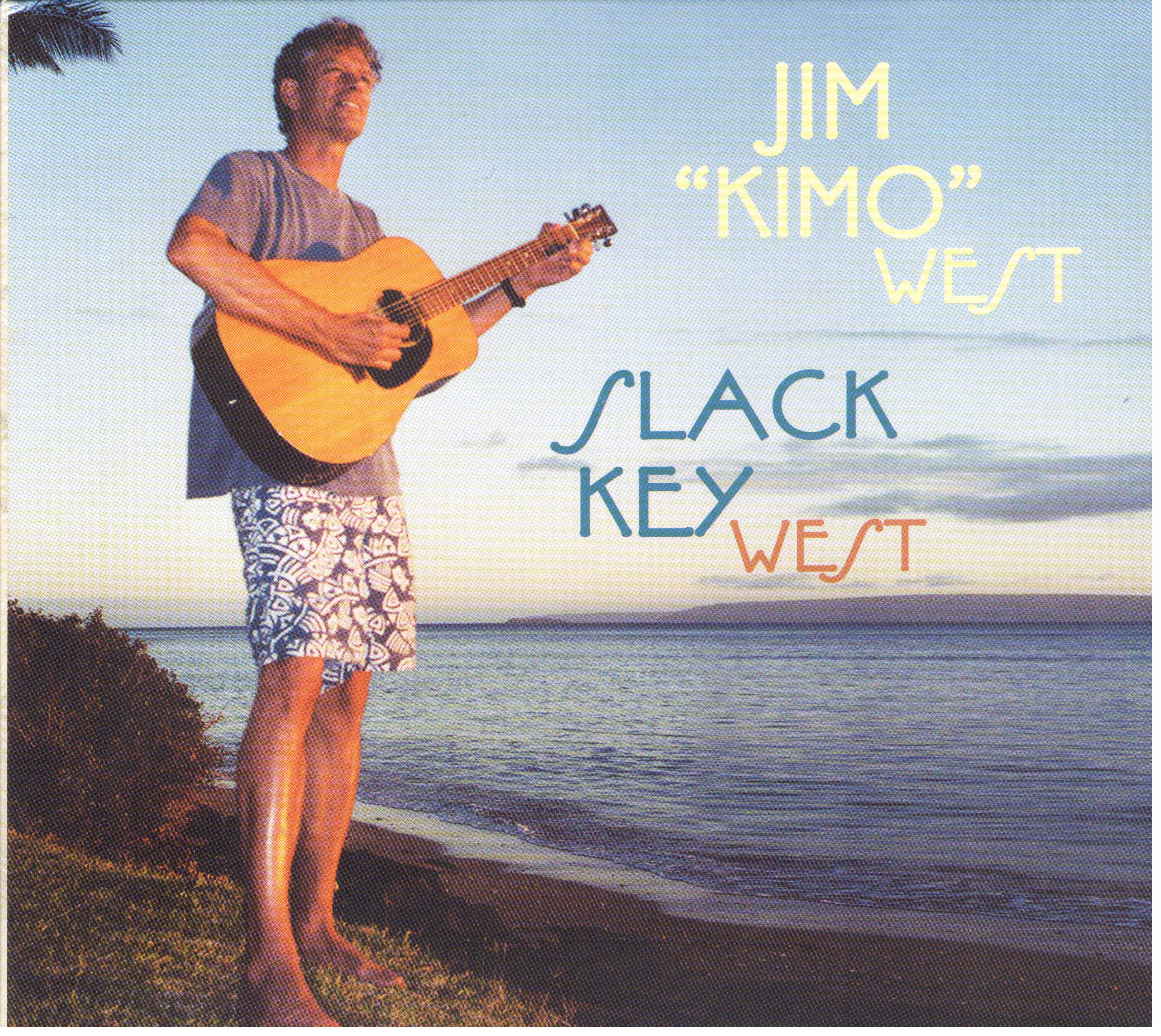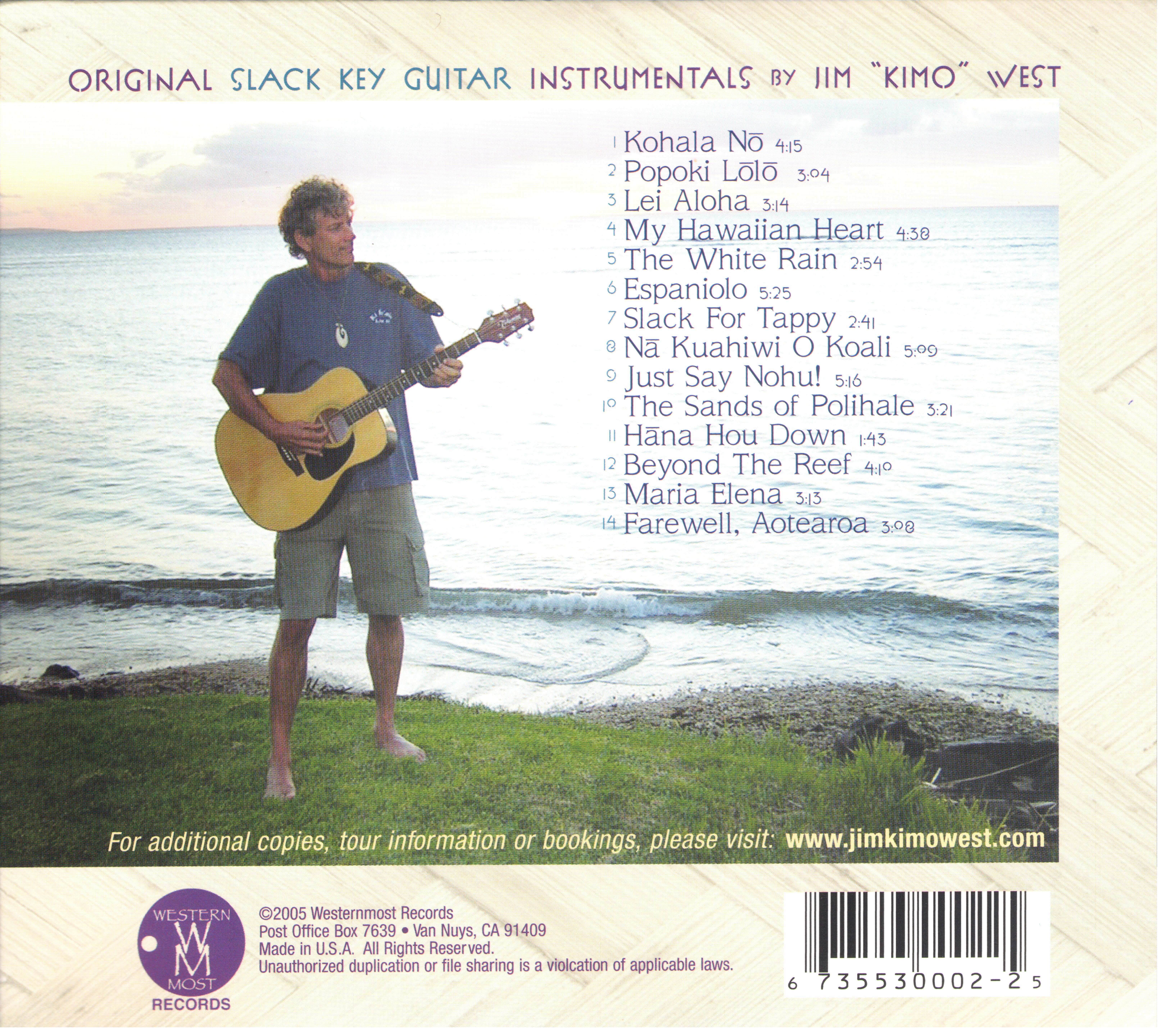

 |
 |
|
| Download CD NOW | Listen on YouTube | |
|
Music always has a story to tell. In whatever form it takes, the history and the present moment merge into something vital that calls out to us to engage. In Hawai’i the music runs as strong as the taro with the same life-giving energy. For multi-instrumentalist and slack key master Jim Kimo West the roots are bone and soul deep. |
No Depression Magazine - The Journal of Roots Music - Mary Catherine Reynolds |
I Love This CD - Five Stars "I was blown away with delight & surprise by very single track on this CD. Kimo West is one of the best and deserves to be widely known and recognized in the world of slack key guitar. His guitar playing has fluidity, style, humor, and tenderness that is uniquely his own. This album is a gem. this player is the real deal." |
iTUNES - Happy in Hawaii |
Heavenly! - Five Stars "My Hawaiian Heart may be the most beautiful song I have ever heard. The entire album will touch your soul and take you straight to the islands. Everyone who hears it wants to know who it is and where they can pick up a copy." |
iTunes - Starfish 1960 |
Stunning - Five Stars "Reminds me of a Chet Atkins kind of a style. Every note on the guitar is crystal clear and the string parts are so full and strong. The guitar continues to play in my head long after listening!" |
iTunes - W. Kellerman |
Jim Kimo West is recognized as one of the world's top slack key guitarists bringing his own unique musical perspective to this great acoustic guitar tradition. Besides his solo slack key career, West is best known as the long-time guitarist on CDs and tours for the world's most famous musical satirist, "Weird Al" Yankovic whose recent CD, Mandatory Fun debuted at #1 on the Billboard charts and won the Grammy for Best Comedy Recording. West is also a prolific composer with a generous output of new, exciting slack key guitar originals. In addition he writes and produces music for too numerous to mention feature films and television shows. A Canadian native, West grew up in Florida and was playing professionally in various rock bands by age 16. A decade later he landed in Los Angeles and began working with "Weird Al" Yankovic. West can be heard on and seen in all of Yankovic's iconoclastic videos, albums, and concerts playing guitar. In 1985 to decompress after a long summer Weird Al tour, Jim made his first trip to Hana, Maui. He fell in love with the culture and the physical landscape of Hawaii. As the sounds of Gabby Pahinui, the Sons of Hawaii, Sonny Chillingworth, The Sunday Manoa, and others played on the turntable, Jim jammed along for fun and relaxation. Already a long-time devotee of open tunings, he was immediately drawn to the gentle rhythms of the slack key guitar and soon began writing his own songs. West didn't concentrate on learning the standard riffs and songs but instead developed his own unique slack key vocabulary which now defines his very unique approach to this great tradition. While always retaining the heartfelt essence of traditional slack key, Jim Kimo West brings his own musical heritage to his original slack key instrumentals. His style can best be described as nahenahe, a Hawaiian term that means soft, sweet, or of gentle voice - a fusion of old and new deeply rooted in tradition. Kimo's seven slack key CD's have garnered him much praise and well over 75 million streams on Pandora and Spotify. Besides being acknowledged by the National Academy of Recording Arts and Sciences for his work on Mandatory Fun, West is also a recipient of the Hawaii Music Awards (American Music Awards equivalent) and has been honored by the Hawaii Academy of Recording Arts with a Na Hoku Hanohano Award (Hawaiian Grammy) nomination, is a two-time winner of the LA Treasures Award for his contributions toward the perpetuation of the Hawaiian slack key guitar, and most recently his album Moku Maluhia (Peaceful Island) received a nomination for the recording industry's most prestigious award, the GRAMMY at The Recording Academy's (NARAS) 61st Annual event. Honoring excellence and exceptional achievement, it is the recording industry's most prestigious award |

Slack Key West by Jim Kimo West - WMR 30002-2
